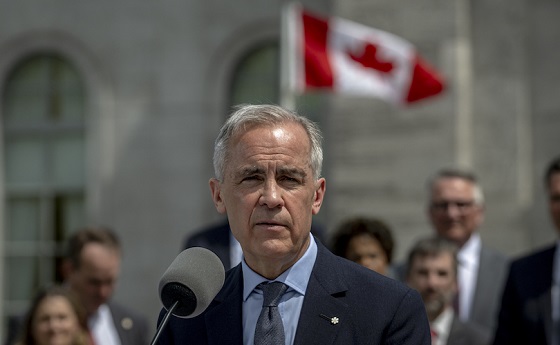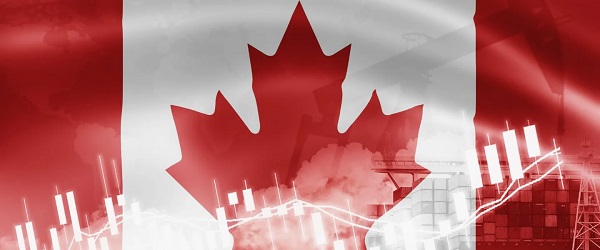Alberta
Watch: Alberta surging toward 100 cases of COVID-19 and shuts down non-essential gatherings of over 50 people

From the Province of Alberta
Aggressive public health measures, including additional limits to mass gatherings, are being implemented provincewide to limit the spread of COVID-19 and protect Albertans.
Latest updates
- Government will declare a state of public health emergency.
- 23 additional cases of COVID-19 have been confirmed in Alberta, bringing the total number of cases in the province to 97. Cases have now been identified in all zones across the province.
- 70 cases in the Calgary zone
- 20 cases in the Edmonton zone
- three cases in the Central zone
- three cases in the South zone
- one case in the North zone
- Mass gatherings are now limited to no more than 50 attendees. This includes worship gatherings and family events such as weddings. Grocery stores, shopping centres, health-care facilities, airports, and other essential services are not included.
- To limit the amount of time Albertans are spending in large crowds and crowded spaces, all Albertans are prohibited from attending public recreational facilities and private entertainment facilities, including gyms, swimming pools, arenas, science centres, museums, art galleries, community centres, libraries, children’s play centres, casinos, racing entertainment centres, and bingo halls.
- Sit-down restaurants, cafés, coffee shops, food courts and other food-serving facilities, including those with a minors-allowed liquor license, are limited to 50 per cent capacity to a maximum of 50 people. Take-out, delivery or drive-through service is permitted.
- Licensed restaurants and bars can now sell liquor without selling food as part of their take-out – with the exception of drive-thru windows – and delivery services to help keep businesses open, staff employed and additional options for Albertans who are self-isolating.
- Changes to the Employment Standards Code have been made to provide job protection for Albertans.
- Albertans are prohibited from attending buffet-style restaurants. At this time, not-for-profit community kitchens, soup kitchens and religious kitchens are exempt, but sanitization practices are expected to be in place and support will be in place for this practice.
- Food services in work camps are also exempt, but in addition to appropriate sanitization practices, arrangements should be made to provide for workers if they are self-isolated.
- $60 million is being provided to help social services organizations respond to critical front-line services.
- Until further notice, all Albertans are restricted from attending bars and nightclubs, where minors are prohibited by law.
- Ski hills across the province are strongly encouraged to close by the end of day March 17, to prevent the spread of COVID-19.
- Effective March 18, all passenger ropeways, like gondolas and chairlifts, will be closed until further notice under the Safety Codes Act.
- All provincial historic sites and the Provincial Archives will be closing March 17. Information regarding facility bookings and passes will be available on the facilities’ websites.
- Upcoming expiry dates for Alberta drivers’ licences, vehicle registrations, other permits and certificates are being extended until May 15.
- Effective immediately, the Seniors Information Office, located on Jasper Avenue in Edmonton, will be closed to protect the health of clients and staff. Seniors in need of information on seniors financial assistance programs should contact Alberta Supports at 1-877-644-9992.
- Alberta Court of Appeal is limiting attendance to necessary parties. Matters continue either electronically or with social distancing directives in effect.
- In-person post-secondary classes remain cancelled as institutions move to alternate delivery formats. Campuses remain open.
Access to justice services
The Office of the Public Guardian and Trustee will be suspending in-person visits with clients or service providers.
Alternative arrangements will include phone, email, Skype, texting and videoconferencing. Contact information can be found at https://www.alberta.ca/contact-office-public-guardian-trustee.aspx.
Traffic Courts: www.albertacourts.ca/pc/resources/announcements//traffic-court-pandemic-scheduling-updated
Alberta Court of Appeal: https://albertacourts.ca/ca/publications/announcements/notice—covid-19
Job-protected leave
Full and part-time employees can access 14 days of job-protected leave for the purpose of self-isolation related to COVID-19, retroactive to March 5.
The leave does not apply to self-employed individuals or contractors.
The requirement to have worked for an employer for 90 days to access COVID-19 specific leave is no longer required.
Employees self-isolating due to COVID-19 do not require a medical note to access leave.
Indigenous community response
First Nations are encouraged to develop community response plans with Indigenous Services Canada and their Directors of Emergency Management and First Nations Field Officer. Indigenous Services Canada can be reached at [email protected].
Metis Settlements are encouraged to develop response plans with their Directors of Emergency Management and Field Officer.
Social services organizations
Funding support is being provided through Family and Community Support Services for adult homeless shelters, women’s emergency shelters and civil society organizations to help keep front-line critical services operating and provide support for vulnerable populations.
Information for travellers
Travel outside the country is strongly discouraged. Given the rapid global spread of the virus, it is no longer possible to assess health risks for the duration of the trip.
Any traveller returning from outside of the country should self-isolate for 14 days, even if they are feeling well, and monitor for symptoms.
Any traveller who has returned before March 12 should closely monitor themselves for symptoms. If they experience symptoms, they should self-isolate immediately and call Health Link 811 for follow-up assessment and testing.
The Alberta government is working with Travel Alberta on a strategy to inform Canadians returning from travel outside the province about the need to self-isolate, and how to access medical care, if needed.
COVID-19-related information is now being provided for returning passengers at the international airports in both Edmonton and Calgary. This information has also been shared with the Fort McMurray International Airport and several airlines.
Quick facts
- The most important measures that Albertans can take to prevent respiratory illnesses, including COVID-19, is to practise good hygiene.
- This includes cleaning your hands regularly for at least 20 seconds, avoiding touching your face, coughing or sneezing into your elbow or sleeve, disposing of tissues appropriately, and staying home and away from others if you are sick.
- Anyone who has health concerns or is experiencing symptoms of COVID-19 should complete an online COVID-19 self-assessment.
- For recommendations on protecting yourself and your community, visit alberta.ca/COVID19.
Alberta
From Underdog to Top Broodmare

WATCH From Underdog to Top Broodmare (video)
Executive Producers Jeff Robillard (Horse Racing Alberta) and Mike Little (Shinelight Entertainment)
What began as an underdog story became a legacy of excellence. Crackers Hot Shot didn’t just race — she paved the way for future generations, and in doing so became one of the most influential producers the province has known.
The extraordinary journey of Crackers Hot Shot — once overlooked, now revered — stands as one of Alberta’s finest success stories in harness racing and breeding.
Born in humble circumstances and initially considered rough around the edges, Crackers Hot Shot overcame long odds to carve out a career that would forever impact the province’s racing industry. From a “wild, unhandled filly” to Alberta’s “Horse of the Year” in 2013, to producing foals who carry her spirit and fortitude into future generations.
Her influence ripples through Alberta’s racing and breeding landscape: from how young stock are prepared, to the aspirations of local breeders who now look to “the mare that did it” as proof that world-class talent can emerge from Alberta’s paddocks.
“Crackers Hot Shot, she had a tough start. She wasn’t much to look at when we first got her” — Rod Starkewski
“Crackers Hot Shot was left on her own – Carl Archibald heard us talking, he said ‘I’ll go get her – I live by there’. I think it took him 3 days to dig her out of the snow. She was completely wild – then we just started working on her. She really needed some humans to work with her – and get to know that people are not scary.” — Jackie Starkewski
“Crackers Hot Shot would be one of the top broodmares in Albeta percentage wise if nothing else. Her foals hit the track – they’re looking for the winners circle every time.” — Connie Kolthammer
Visit thehorses.com to learn more about Alberta’s Horse Racing industry.
Alberta
Province orders School Boards to gather data on class sizes and complexity by Nov 24

Better data, better outcomes for Alberta students |
To help schools address classroom complexity, Alberta’s government will begin collecting annual data on class size and composition.
Over the past three years, Alberta has welcomed more than 80,000 new students. With this unprecedented growth, classroom complexity and class sizes are among the biggest issues facing schools and teachers across the province.
To meet this challenge head on, Alberta’s government will work with school boards to gather yearly data on class sizes and composition. This information will be used to better understand staffing, student needs and classroom complexity. School boards will be required to submit data on Alberta classrooms by Nov. 24, and by January, this data will be made publicly available and will then be released annually.
Data collected on classroom complexity will help the province understand and address issues in schools, including class sizes, and support strategic investments in classrooms. Over the next three years, school boards will be provided with funding to hire 3,000 teachers and 1,500 new education assistants to support students with complex needs.
“We are ready to work with school boards and teachers to address classroom complexity and class sizes. We have heard them loud and clear and we are taking bold action to address these issues.”
Alberta’s government is establishing a Class Size and Complexity Task Force to begin work immediately on identifying solutions to the challenges facing Alberta classrooms. Alongside new annual data collection, the task force will ensure every student gets the attention and support they need to succeed. Details about the task force will be shared in the coming weeks.
“This data will provide essential insight into classroom realities, guiding evidence-based decisions and advocating for sustainable funding to address complexity, ensuring every student and educator in Alberta has the support to thrive.”
Quick facts
To inform decisions on addressing classroom complexity, data will be collected on total numbers of:
- all staff, per school, including roles
- substitute teachers
- district staff, listed by job title
- students, per classroom, per school
- severe, mild/moderate, and gifted/talented students, per classroom, per school
- English as an additional language (EAL) students, per classroom, per school
- refugee students, per classroom, per school
- First Nations, Métis and Inuit students, per classroom, per school
- Individualized Program Plans, per classroom, per school
- students waitlisted for assessment, per classroom, per school
- incidents of aggression and violence
- $55 million was provided in Budget 2025 to address classroom complexity.
- 8.6 billion is being invested to build and renovate more than 130 schools across the province.
- Budget 2025 is investing $1.6 billion in learning support funding to help meet students’ specialized learning needs.
- Budget 2025 is investing $1.1 billion to hire more than 4,000 teachers and educational staff.
-

 Alberta7 hours ago
Alberta7 hours agoFrom Underdog to Top Broodmare
-

 International18 hours ago
International18 hours agoPrince Andrew banished from the British monarchy
-

 Alberta2 days ago
Alberta2 days agoNobel Prize nods to Alberta innovation in carbon capture
-

 Business1 day ago
Business1 day agoCanada’s attack on religious charities makes no fiscal sense
-

 Business17 hours ago
Business17 hours ago“We have a deal”: Trump, Xi strike breakthrough on trade and fentanyl
-

 Bruce Dowbiggin1 day ago
Bruce Dowbiggin1 day agoGet Ready: Your House May Not Be Yours Much Longer
-

 Crime17 hours ago
Crime17 hours agoCanada Seizes 4,300 Litres of Chinese Drug Precursors Amid Trump’s Tariff Pressure Over Fentanyl Flows
-

 National2 days ago
National2 days agoCanadian MPs order ethics investigation into Mark Carney’s corporate interests










